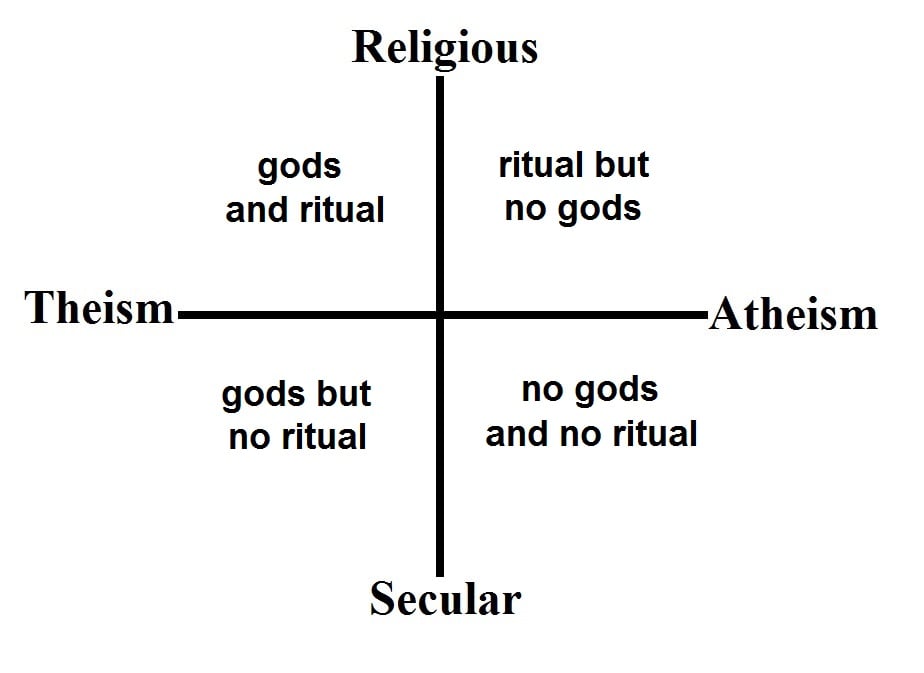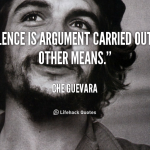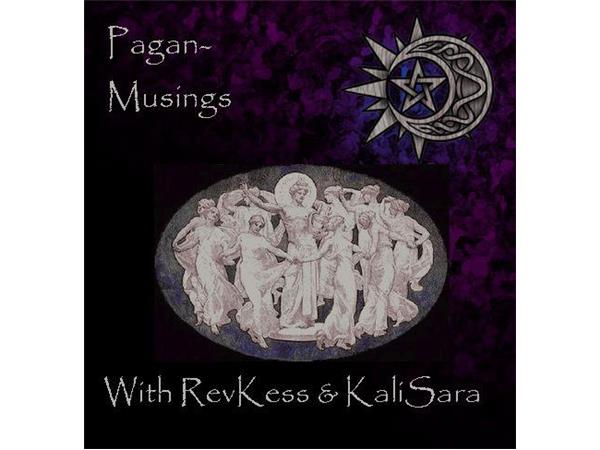(image courtesy of Wikipedia/Creative Commons)
I recently came across a blogger calling themselves “The Veiled Witch” who made the claim that “Pagan atheism is secular humanism.” The entire post, the title of which was “Pagan Atheism: is this a thing?”, was dismissive of “Pagan atheism.” It was clear that the author really did not care to know if atheist Paganism (or “Pagan atheism”) is “a thing,” and that she obviously felt threatened by it. She also had not done her homework. Two of the four blogs you she linked to as examples of “Pagan atheism,” were not even Pagans. One was a self-described ex-Neo-Pagan and the other was a polyamorous atheist. The other two were Stifyn Emrys’ blog and my own blog here. I attempted to respond to the author, but she has ignored me.
Out of all of it, the statement, “Pagan atheism is secular humanism,” bothered me the most. Lately, I’ve been giving some thought to why. And I think the statement is dismissive in two different ways. First, it attempts to dismiss atheist Paganism as secularism. Second it attempts to reduce atheist Paganism to humanism. In what follows, I want explain why atheist Paganism is not secular and why it cannot be reduced to humanism.
Why atheist Paganism is not “secular”
What is Atheism?
You’d think “atheism” would be easy to define, but it’s not. This weekend, at my Unitarian church, I told someone I was an atheist Pagan, and she (neither an atheist nor a Pagan) became visibly agitated. I got the feeling that the word “atheist” meant something to her that maybe it didn’t mean to me. The person I was talking to seemed to feel much better calling me a “non-theist.” But what exactly is the difference between a-theism and non-theism? For some, it seems, the word “atheist” implies a reductive materialism or an anti-theism (think the New Atheists). I guess “non-theist” seems less threatening. But non-theism can mean anything from not believing in any deities to not believing in a certain kind of deities. For example, according to some definitions, pantheism is a form of non-theism (in spite of the obvious etymological problem of that categorization). And non-theism can also mean a kind of agnosticism or indifference to the question of the existence of deities.
When I call myself an atheist, I usually am trying to communicate that I don’t believe in “Gods” or “gods” in the way most people mean those words, i.e., reified “distinct, independent” (supernatural) beings. But I will sometimes call myself a non-theist when I want to talk about other conceptions of divinity that I do embrace, like pantheism or archetypal polytheism, which I think are more consistent with scientific naturalism.
What does “secular” mean?
“Secularism” is often refers to the separation of religious and government institutions. That’s not the definition we’re talking about here. When the Veiled Witch says Pagan atheism is “secular humanism,” she’s not talking about a humanism that endorses the separation of church and state. She means a humanism that is “non-religious.” This is the second definition of secular. But defining “secular” as “non-religious” which raises the even more problematic question of what is “religious.”
I’m not going to try to define “religion,” but I do want to identify some things that it is not. “Religion” is not synonymous with belief in the supernatural. Some people seem to think that, if you don’t believe in the supernatural, then you’re “secular.” If this were the case, then a lot of Pagans would be “secular,” since many Pagan reject the naturalism-supernaturalism dichotomy altogether. “Religion” is also not synonymous with “theism.” There are clearly non-theistic forms of religiosity, like Buddhism and Taoism.
Secularism and Ritual
It should also be said that “secular” is not synonymous with “meaningless.” I think this is the sense in which the Veiled Witch meant the word when she said Pagan atheism is “secular”. She was attempting to denigrate it. But these are many secular activities which are full of meaning. Holidays, like Valentine’s, the Fourth of July, and birthdays, as well as social action like Pride Day marches and environmental protests, can be entirely “secular,” but deeply meaningful.
So what then is the difference between secular and religious? I think we can illustrate the difference by considering the difference between secular humanism and religious humanism. Many people may not realize that the two movements are distinct, both conceptually and historically. Secular humanism has its roots in the Ethical Culture movement founded by Felix Adler in the 19th century. Secular humanism tends to eschew any of the “trappings” of religion, including most ritual or ceremony. Even the lighting of candles or communal singing may be viewed by secular humanist with skepticism. In contrast, religious humanism is more closely related to Unitarian Universalism, and it embraces religious ritual, at least to some degree. The difference, then, between the secular and the religious may be said turn on one’s attitude toward ritual.
Of course, there are secular rituals. All of the secular activities mentioned above — Holidays, like Valentine’s, the Fourth of July, and birthdays, as well as social action like Pride Day marches and environmental protests — involve symbolic actions, i.e., rituals. But most people don’t recognize them as such. In fact, if I told someone buying a Valentine’s Day card or marching for marriage equality that they were participating in a “ritual,” they might be offended. But most people recognize that what happens inside the walls of a church is ritual. So, the difference between the “religious” and the “secular” isn’t whether there is ritual, but whether we recognize and embrace the ritual as such.
Belief and Practice
When the Veiled Witch calls atheism “secular,” I think she is conflating two different categories altogether. We can think of theism and atheism as existing on a spectrum, a spectrum of belief. On the other hand, we can think of the religious and the secular as existing on another spectrum, a spectrum of practice. The theist-atheist spectrum deals with the question of belief, specifically, belief in deity. The religion-secularism spectrum deals with practice, specifically ritual. These two spectrums intersect and create four quadrants.
 Religious theism/theistic religion: combines the belief in deity or deities with a ritual practice. These are most of the folks that attend weekly religious services in the U.S. This also includes Pagans who believe in gods and engage in devotions to deities or celebrate the Wheel of the Year.
Religious theism/theistic religion: combines the belief in deity or deities with a ritual practice. These are most of the folks that attend weekly religious services in the U.S. This also includes Pagans who believe in gods and engage in devotions to deities or celebrate the Wheel of the Year.
Secular theism/theistic secularism: includes a belief in deity or deities but without any ritual practice. These are the believers who want nothing to do with organized religion and those who describe themselves as “spiritual but not religious” but don’t have any regular spiritual practice. It also includes “spiritual but not religious” Pagans who believe in gods and goddesses, but don’t really practice, either privately or with any group.
Religious atheism/atheistic religion: includes ritual practice, but without the belief in deity and deities. This includes many Buddhists and Unitarians, for example. It also includes Atheist Pagans, and many Humanistic Pagans and Naturalistic Pagans, who do not believe in gods, but who do celebrate the Wheel of the Year or perform other Pagan rituals in a meaningful way.
Secular atheism/atheistic secularism: involves no belief in deity and no ritual practice. I think this might include atheists who attend Pagan ritual for fun or for the after party. They may participate in the ritual, but it is not meaningful to them. I think there is a fear, on the part of some theistic Pagans, that atheist Pagans fall into this category. This is why I balk at the Veiled Witch conflating religious atheism and secular atheism. I am a religious atheist, not a secular atheist. When I attend a Pagan ritual, I’m not there to socialize or have fun (although I may do those things too). I am there to have a religious experience, to connect with something larger than myself (even if it is not deity).
Why atheist Paganism can’t be reduced to humanism
What is Humanism?
Atheism and humanism have a lot of overlap. Most humanists are probably atheists. Both humanists and atheists tend to be philosophical naturalists (rejecting supernaturalism). But atheism and humanism are two different things. Atheism is about disbelief in gods. Humanism is about belief in humans — in human goodness and human potential. Humanists tend to share a human-centered ethics, although increasingly the humanist ethic is being expanded to include all forms of life in a bio-centered ethic.
Theism and the Three Centers of Paganism
There are atheist Pagans who are Humanistic Pagans. Humanistic Pagans may be Pagans who share a love of the myth and ritual of Paganism, but not belief in literal deities, as well as non-theists who are looking for a spiritual practice to help them celebrate the natural world or experience a deeper connection to the Universe in a way that is consistent with scientific naturalism. But I don’t think the Veiled Witch was really talking about humanism as something positive when she said that atheist Paganism is “secular humanism.” I think she was being dismissive again. It’s not stated, but I think it’s implied that, from her perspective, if one is not deity-centered, then one must be human-centered. This is a common accusation I hear from some deity-centered polytheists: that non-theistic Paganism is self-centered. It’s true that there are forms of Paganism that are Self-centered, but the “Self” in question is not the ego, but the Deep Self, the divine within. But not all non-theistic Pagans are centered on the Deep Self either. Some are are earth-centered or nature-centered.
Like some other deity-centered polytheists, the Veiled Witch claims that Paganism cannot be divorced from polytheism. Obviously, that’s not true. At the recent Parliament of the World’s Religions, for example, Don Frew defined a “pagan” as anyone whose spirituality is an expression of their relationship with the place where they live. This is similar to Emma Restall Orr’s definition of pagan as one who looks “to the landscape, the environment, the ecology of a place, nature herself, for guidance in every aspect of their lives.” I think these definitions are consistent with the history of the word “pagan,” which meant the people of the countryside (from Latin paganus, civilian, country dweller, from pagus country district). Of course, I’m comfortable with these definitions, because they jibe with my own focus on the land and nature. But they don’t take account of those Self-centered or deity-centered Pagans for whom the earth/nature is not a major focus.
Inclusive Paganism
When we talk about capital-P “Paganism,” we have to do it in a way that takes into account the diversity of the contemporary Pagan movement, which is not a single religion, but a family of related religious paths. If I had to define “Pagan” (uppercase) I would say it refers to anyone who (1) looks toward the ancient pagans for religious inspiration and (2) chooses to be identified as Pagan or part of the Pagan family of religious paths. I think that is sufficiently broad to include just about everyone who wants to be included, but excludes others who want to be excluded. It’s clear that the idea of “atheist Paganism” creates a lot of cognitive dissonance for some people, like the Veiled Witch. She writes:
“Let pagan atheism be what it actually is. Pagan atheism is secular humanism. Let us know them by their true name and deal with them on our own terms. Allowing them to define the discussion (which they have been doing thus far in many cases) is leading to a denigration of all pagan belief systems. We must stand up and calmly refute their positions and reassert that we’re an equally valid belief system, regardless of what pagan belief system we practice.”
My hope is that the Veiled Witch will come to see that, yes, atheist Paganism is “a thing,” and that she will extend the same courtesy of acknowledging that “we’re an equally valid belief system” to atheist Pagans as well.
John Halstead
Grok Earth! Thou art God/dess!

















